Module 12 Western music Unit 3 Language in use教学课件(共32张PPT)
文档属性
| 名称 | Module 12 Western music Unit 3 Language in use教学课件(共32张PPT) |
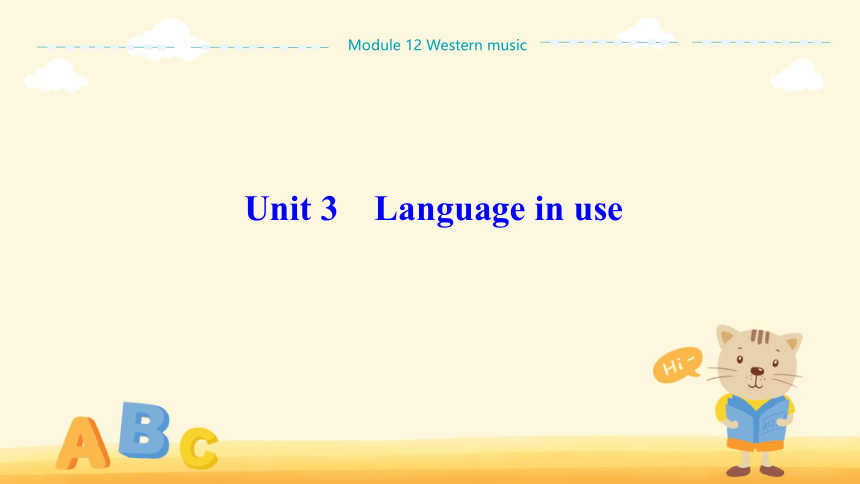
|
|
| 格式 | ppt | ||
| 文件大小 | 1.8MB | ||
| 资源类型 | 教案 | ||
| 版本资源 | 外研版 | ||
| 科目 | 英语 | ||
| 更新时间 | 2023-03-08 00:00:00 | ||
图片预览

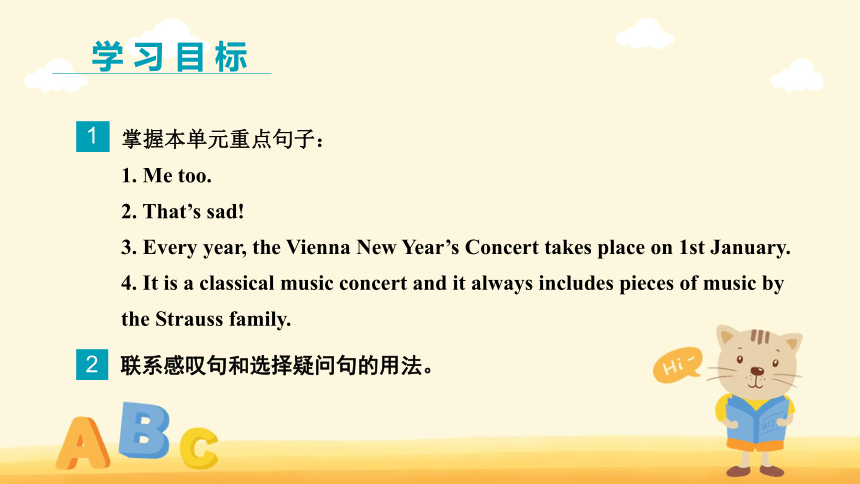
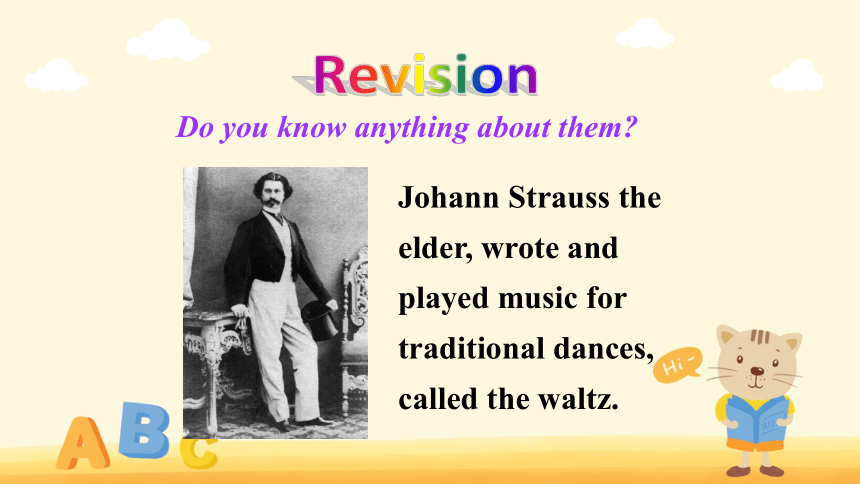
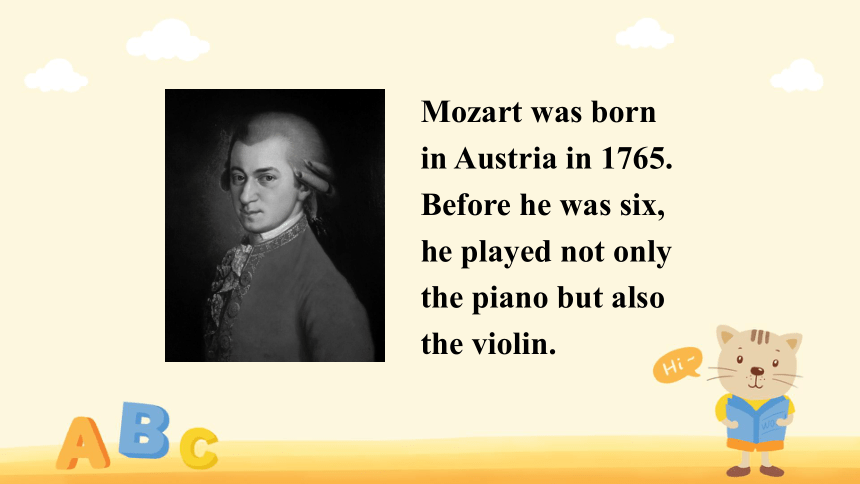
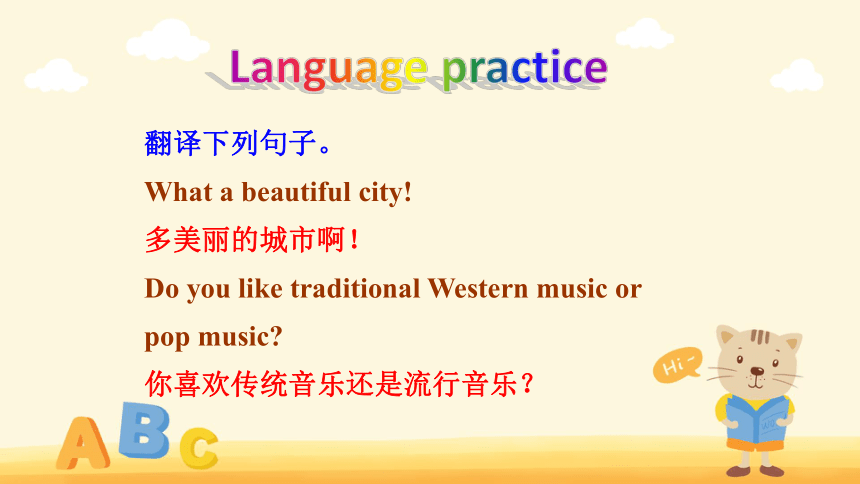
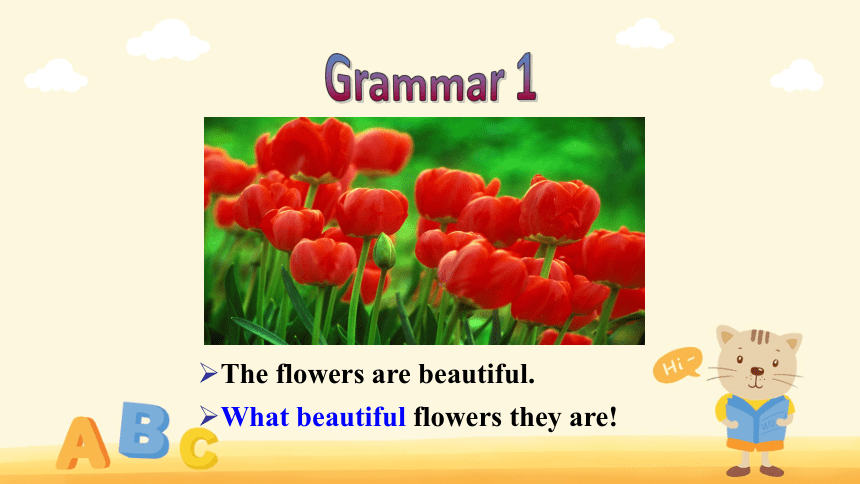
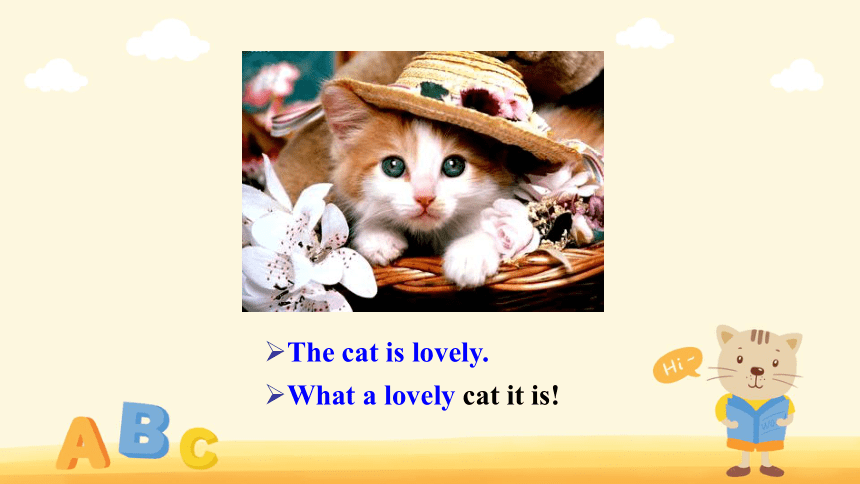
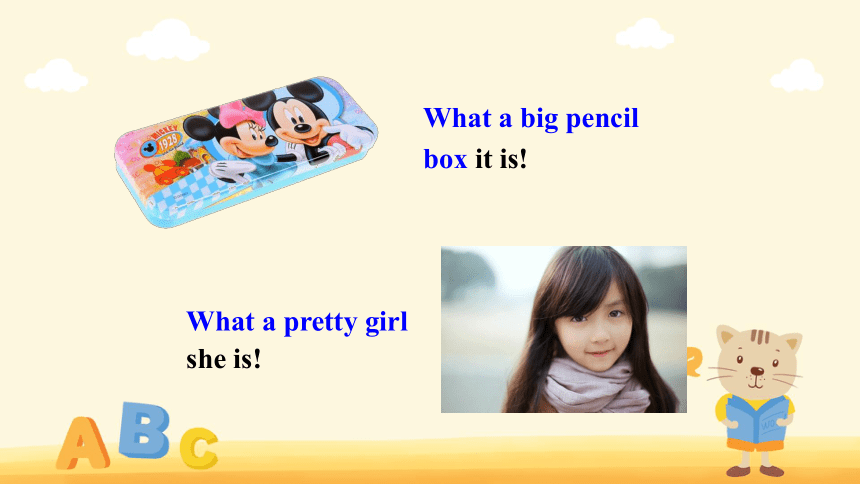
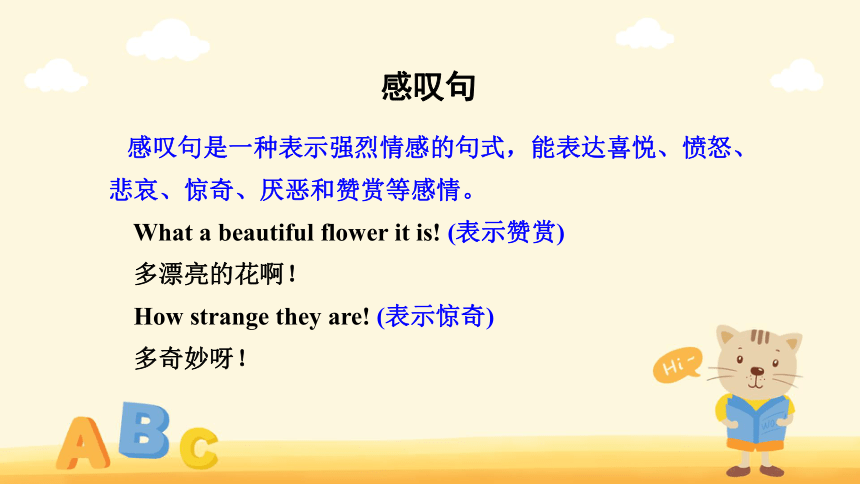
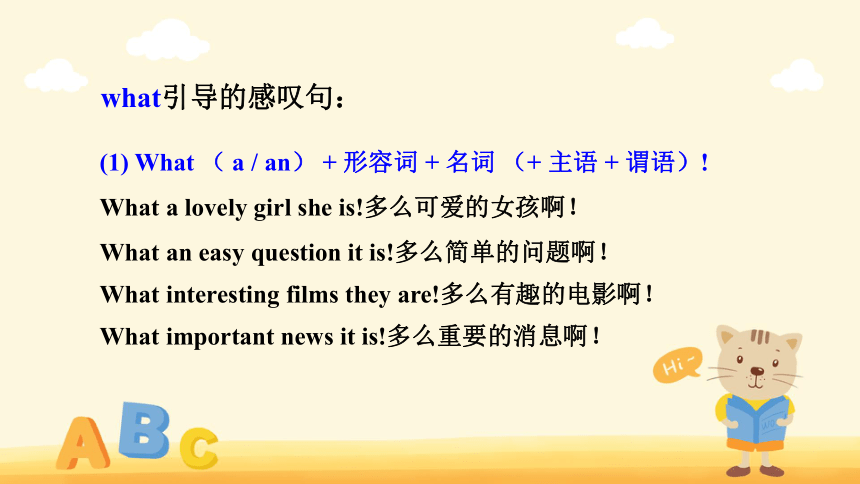
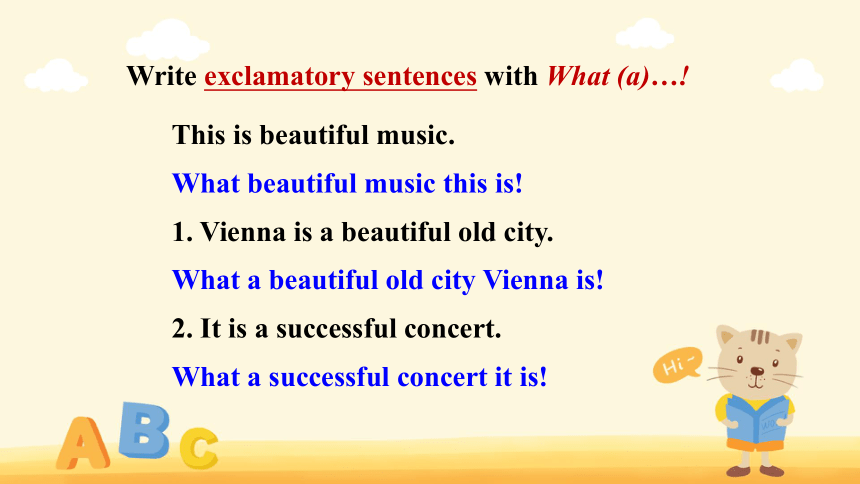
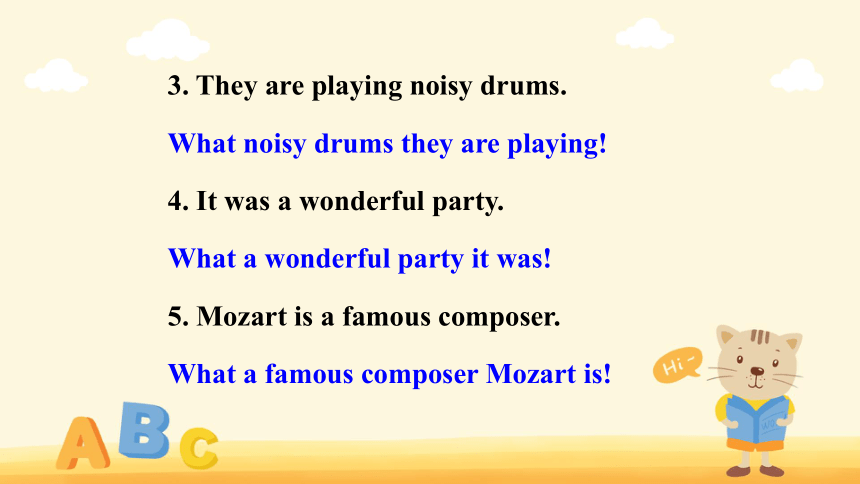
文档简介
(共32张PPT)
Unit 3 Language in use
Module 12 Western music
学 习 目 标
1
2
联系感叹句和选择疑问句的用法。
掌握本单元重点句子:
1. Me too.
2. That’s sad!
3. Every year, the Vienna New Year’s Concert takes place on 1st January.
4. It is a classical music concert and it always includes pieces of music by the Strauss family.
Johann Strauss the elder, wrote and played music for traditional dances, called the waltz.
Do you know anything about them
Mozart was born in Austria in 1765. Before he was six, he played not only the piano but also the violin.
翻译下列句子。
What a beautiful city!
多美丽的城市啊!
Do you like traditional Western music or pop music
你喜欢传统音乐还是流行音乐?
The flowers are beautiful.
What beautiful flowers they are!
The cat is lovely.
What a lovely cat it is!
What a pretty girl she is!
What a big pencil box it is!
感叹句是一种表示强烈情感的句式,能表达喜悦、愤怒、悲哀、惊奇、厌恶和赞赏等感情。
What a beautiful flower it is! (表示赞赏)
多漂亮的花啊!
How strange they are! (表示惊奇)
多奇妙呀!
感叹句
what引导的感叹句:
(1) What ( a / an) + 形容词 + 名词 (+ 主语 + 谓语)!
What a lovely girl she is!多么可爱的女孩啊!
What an easy question it is!多么简单的问题啊!
What interesting films they are!多么有趣的电影啊!
What important news it is!多么重要的消息啊!
Write exclamatory sentences with What (a)…!
This is beautiful music.
What beautiful music this is!
1. Vienna is a beautiful old city.
2. It is a successful concert.
What a beautiful old city Vienna is!
What a successful concert it is!
3. They are playing noisy drums.
4. It was a wonderful party.
5. Mozart is a famous composer.
What noisy drums they are playing!
What a wonderful party it was!
What a famous composer Mozart is!
感叹词(以及副词、形容词)表示的感叹句:
Oh! 啊!哦!哎哟!
Well! 好啦!
Why! 什么(话)!嗯!岂有此理!好好!
Excellent! 好极了!
短语表示的感叹句:
Dear me! 哎呀!
Great Heavens! 天哪!
知识拓展
带有强烈感情的语调说出的陈述句、疑问句和祈使句变成
的感叹句(书面语,句末用感叹号):
I am so angry!
我太生气了!
Could one have believed it!
谁肯相信这个!
Don’t you say that again!
你可不要再说那个了!
Happy birthday, Tony!
生日快乐,托尼!
祈 使句
Observe the following sentences carefully. Pay attention to the words in red.
Do you like traditional Western music or pop music
Is this by Strauss or Mozart
3. Is it by the father or the son
4. Shall we go home or stay here
5. Did you come here by bus or by car
选择疑问句
在问句中提供两个或两个以上可选答案的问句叫做选择疑问句。选择疑问句的两种或两种以上的情况用or连接,回答时不能用yes或no。在口语中,选择疑问句的语调应是第一个选择项读升调,第二个选择项读降调。选择疑问句可以分为一般选择疑问句和特殊选择疑问句两种。
一般选择疑问句
句型:一般疑问句+or +被选择的情况?
— Are you a teacher or a student
你是老师还是学生?
— I’m a student.
我是学生。
— Did you work out the math problem in this way or (in) that way
你是用这种方法还是用那种方法把这道数学题算出来的?
— I did it in that way.
我是用那种方法算出来的。
特殊选择疑问句
句型:特殊疑问句, A or B
— Which is bigger, Beijing or New York
哪个城市大些,北京还是纽约?
— Beijing.
北京。
— When will he leave for London, today or tomorrow
他何时动身去伦敦,今天还是明天?
— Tomorrow.
明天。
注意 :
1. or之后如果是单数可数名词,必须要加上冠词。
2. 选择疑问句中or所连接的可以是不同的内容,如两个名词,两个动词,两个介词短语等。但or所连接的内容一定是并列的,如果or的前面是名词,其后也应该是名词;如果是动词,其后也必须是动词。不能前面是名词,后面却接一个动词。
1. Write questions.
You / like / pop / traditional music
Do you like pop or traditional music
1. (be) / Strauss / German / Austrian
2. (be) / this / pop / rock
Is Strauss German or Austrian
Is this pop music or rock music
3. They / play / traditional music / modern music
4. He / play / piano / violin
5. Where / (can) we / hear / rock music / in / New York /
London
Do they play traditional music or modern music
Does he play the piano or the violin
Where can we hear rock music, in New York or in London
Type of music Instruments People
3. Put the words and expressions into the correct column.
drum fan musician piano pop rock traditional music violin
pop
rock
drum
fan
musician
piano
traditional music
violin
Lingling: This is beautiful music.
Who wrote it, Betty
Betty: Beethoven wrote it. He was a great musician. I (1)______his
music.
Lingling: Me too. Did he live at the same time as Mozart
4 Complete the conversation with the correct form of the
words from the box.
come give hear learn love write
love
Betty: Yes, he was born in 1770 and began to (2) ___________music at an early age. He (3) ___________his first piano concert when he was only seven.
Lingling: When did he start to (4)_____music
Betty: Very early. His first work (5) _____out before the age of thirteen.
come give hear learn love write
learn
gave
write
came
Lingling: Was Beethoven famous at that time
Betty: Yes. But he began to lose his hearing.
In the last ten years of Beethoven’s life, he (6)______nothing.
Lingling: That’s sad!
Betty: Yes, but he still played the piano.
He died when he was fifty-six.
heard
come give hear learn love write
Every year, the Vienna New Year’s Concert takes place on 1st January. It is a classical music concert and it always includes pieces of music by the Strauss family. People all over the world watch it on TV and enjoy the music.
Vienna New Year's Concert
Talking about
Chinese music
Choose one or two types of Chinese music and
describe them. Use the words from the box.
Say which types of music you like.
Give your reasons.
5. Work in pairs. Talk about one or two types of Chinese
music.
beautiful fast lively
modern sad slow
Now talk about Chinese music in front of the class.
I. 根据要求改写句子。
Betty enjoys fast music.
(用slow music改为选择疑问句)
______ Betty ______ fast music ____ slow music
2. His sister is a beautiful girl.
(改为感叹句)
_____ _____ ________ girl his sister is!
3. The meat is very delicious.
(改为感叹句)
________ ________ meat it is!
Does enjoy or
What a beautiful
What delicious
Ⅱ. 根据汉语提示写出正确的英语句子。
1. 你喜欢红色还是蓝色? 2. 多么大的一个箱子! 3. 你们是骑自行车还是坐公交车去公园的? 4. 多么美味的食物啊! 5. 这些照片多漂亮啊!
Do you like red or blue
What a big box (it is)!
Did you go to the park by bike or by bus
What delicious food (it is)!
How beautiful the photos are!
1. ________ difficult homework we had yesterday!
2. _______ cute dog it is!
3. ________ honest boy Tom is!
4. ________ tasty smell the cake gave off!
5. ________ good time we had on the beach yesterday!
6. ________ exciting news you’ve brought us!
What
What a
What an
What
What a
What
Ⅲ. 完成感叹句
1. Review the grammar we’ve learned today.
2. Finish the exercises in this module
Unit 3 Language in use
Module 12 Western music
学 习 目 标
1
2
联系感叹句和选择疑问句的用法。
掌握本单元重点句子:
1. Me too.
2. That’s sad!
3. Every year, the Vienna New Year’s Concert takes place on 1st January.
4. It is a classical music concert and it always includes pieces of music by the Strauss family.
Johann Strauss the elder, wrote and played music for traditional dances, called the waltz.
Do you know anything about them
Mozart was born in Austria in 1765. Before he was six, he played not only the piano but also the violin.
翻译下列句子。
What a beautiful city!
多美丽的城市啊!
Do you like traditional Western music or pop music
你喜欢传统音乐还是流行音乐?
The flowers are beautiful.
What beautiful flowers they are!
The cat is lovely.
What a lovely cat it is!
What a pretty girl she is!
What a big pencil box it is!
感叹句是一种表示强烈情感的句式,能表达喜悦、愤怒、悲哀、惊奇、厌恶和赞赏等感情。
What a beautiful flower it is! (表示赞赏)
多漂亮的花啊!
How strange they are! (表示惊奇)
多奇妙呀!
感叹句
what引导的感叹句:
(1) What ( a / an) + 形容词 + 名词 (+ 主语 + 谓语)!
What a lovely girl she is!多么可爱的女孩啊!
What an easy question it is!多么简单的问题啊!
What interesting films they are!多么有趣的电影啊!
What important news it is!多么重要的消息啊!
Write exclamatory sentences with What (a)…!
This is beautiful music.
What beautiful music this is!
1. Vienna is a beautiful old city.
2. It is a successful concert.
What a beautiful old city Vienna is!
What a successful concert it is!
3. They are playing noisy drums.
4. It was a wonderful party.
5. Mozart is a famous composer.
What noisy drums they are playing!
What a wonderful party it was!
What a famous composer Mozart is!
感叹词(以及副词、形容词)表示的感叹句:
Oh! 啊!哦!哎哟!
Well! 好啦!
Why! 什么(话)!嗯!岂有此理!好好!
Excellent! 好极了!
短语表示的感叹句:
Dear me! 哎呀!
Great Heavens! 天哪!
知识拓展
带有强烈感情的语调说出的陈述句、疑问句和祈使句变成
的感叹句(书面语,句末用感叹号):
I am so angry!
我太生气了!
Could one have believed it!
谁肯相信这个!
Don’t you say that again!
你可不要再说那个了!
Happy birthday, Tony!
生日快乐,托尼!
祈 使句
Observe the following sentences carefully. Pay attention to the words in red.
Do you like traditional Western music or pop music
Is this by Strauss or Mozart
3. Is it by the father or the son
4. Shall we go home or stay here
5. Did you come here by bus or by car
选择疑问句
在问句中提供两个或两个以上可选答案的问句叫做选择疑问句。选择疑问句的两种或两种以上的情况用or连接,回答时不能用yes或no。在口语中,选择疑问句的语调应是第一个选择项读升调,第二个选择项读降调。选择疑问句可以分为一般选择疑问句和特殊选择疑问句两种。
一般选择疑问句
句型:一般疑问句+or +被选择的情况?
— Are you a teacher or a student
你是老师还是学生?
— I’m a student.
我是学生。
— Did you work out the math problem in this way or (in) that way
你是用这种方法还是用那种方法把这道数学题算出来的?
— I did it in that way.
我是用那种方法算出来的。
特殊选择疑问句
句型:特殊疑问句, A or B
— Which is bigger, Beijing or New York
哪个城市大些,北京还是纽约?
— Beijing.
北京。
— When will he leave for London, today or tomorrow
他何时动身去伦敦,今天还是明天?
— Tomorrow.
明天。
注意 :
1. or之后如果是单数可数名词,必须要加上冠词。
2. 选择疑问句中or所连接的可以是不同的内容,如两个名词,两个动词,两个介词短语等。但or所连接的内容一定是并列的,如果or的前面是名词,其后也应该是名词;如果是动词,其后也必须是动词。不能前面是名词,后面却接一个动词。
1. Write questions.
You / like / pop / traditional music
Do you like pop or traditional music
1. (be) / Strauss / German / Austrian
2. (be) / this / pop / rock
Is Strauss German or Austrian
Is this pop music or rock music
3. They / play / traditional music / modern music
4. He / play / piano / violin
5. Where / (can) we / hear / rock music / in / New York /
London
Do they play traditional music or modern music
Does he play the piano or the violin
Where can we hear rock music, in New York or in London
Type of music Instruments People
3. Put the words and expressions into the correct column.
drum fan musician piano pop rock traditional music violin
pop
rock
drum
fan
musician
piano
traditional music
violin
Lingling: This is beautiful music.
Who wrote it, Betty
Betty: Beethoven wrote it. He was a great musician. I (1)______his
music.
Lingling: Me too. Did he live at the same time as Mozart
4 Complete the conversation with the correct form of the
words from the box.
come give hear learn love write
love
Betty: Yes, he was born in 1770 and began to (2) ___________music at an early age. He (3) ___________his first piano concert when he was only seven.
Lingling: When did he start to (4)_____music
Betty: Very early. His first work (5) _____out before the age of thirteen.
come give hear learn love write
learn
gave
write
came
Lingling: Was Beethoven famous at that time
Betty: Yes. But he began to lose his hearing.
In the last ten years of Beethoven’s life, he (6)______nothing.
Lingling: That’s sad!
Betty: Yes, but he still played the piano.
He died when he was fifty-six.
heard
come give hear learn love write
Every year, the Vienna New Year’s Concert takes place on 1st January. It is a classical music concert and it always includes pieces of music by the Strauss family. People all over the world watch it on TV and enjoy the music.
Vienna New Year's Concert
Talking about
Chinese music
Choose one or two types of Chinese music and
describe them. Use the words from the box.
Say which types of music you like.
Give your reasons.
5. Work in pairs. Talk about one or two types of Chinese
music.
beautiful fast lively
modern sad slow
Now talk about Chinese music in front of the class.
I. 根据要求改写句子。
Betty enjoys fast music.
(用slow music改为选择疑问句)
______ Betty ______ fast music ____ slow music
2. His sister is a beautiful girl.
(改为感叹句)
_____ _____ ________ girl his sister is!
3. The meat is very delicious.
(改为感叹句)
________ ________ meat it is!
Does enjoy or
What a beautiful
What delicious
Ⅱ. 根据汉语提示写出正确的英语句子。
1. 你喜欢红色还是蓝色? 2. 多么大的一个箱子! 3. 你们是骑自行车还是坐公交车去公园的? 4. 多么美味的食物啊! 5. 这些照片多漂亮啊!
Do you like red or blue
What a big box (it is)!
Did you go to the park by bike or by bus
What delicious food (it is)!
How beautiful the photos are!
1. ________ difficult homework we had yesterday!
2. _______ cute dog it is!
3. ________ honest boy Tom is!
4. ________ tasty smell the cake gave off!
5. ________ good time we had on the beach yesterday!
6. ________ exciting news you’ve brought us!
What
What a
What an
What
What a
What
Ⅲ. 完成感叹句
1. Review the grammar we’ve learned today.
2. Finish the exercises in this module
同课章节目录
- Module 1 Lost and found
- Unit 1 Whose bag is this?
- Unit 2 Are they yours?
- Unit 3 Language in use
- Module 2 What can you do ?
- Unit 1 I can play the piano
- Unit 2 I can run really fast
- Unit 3 Language in use
- Module 3 Making plans
- Unit 1 What are you going to do at the weekends?
- Unit 2 We're going to cheer the players.
- Unit 3 Language in use
- Module 4 Life in the future
- Unit 1 Everyone will study at home
- Unit 2 Every family will have a small plane.
- Unit 3 Language in use
- Module 5 Shopping
- Unit 1 What can I do for you?
- Unit 2 You can buy everything on the Internet
- Unit 3 Language in use
- Module 6 Around town
- Unit 1 Could you tell me how to get to the Nationa
- Unit 2 The London Eye is on your right.
- Unit 3 Language in use
- Revision module A
- Module 7 My past life
- Unit 1 I was born in a small village.
- Unit 2 I was born in Quincy.
- Unit 3 Language in use
- Module 8 Story time
- Unit 1 Once upon a time….
- Unit 2 Goldilocks hurried out of the house.
- Unit 3 Language in use
- Module 9 Life history
- Unit 1 He left school and began work at the age of
- Unit 2 He decided to be an actor.
- Unit 3 Language in use
- Module 10 A holiday journey
- Unit 1 What did you do?
- Unit 2 This morning we took a walk.
- Unit 3 Language in use
- Module 11 Body language
- Unit 1 They touch noses!
- Unit 2 Here are some ways to welcome them.
- Unit 3 Language in use
- Module 12 Western music
- Unit 1 It's so beautiful!
- Unit 2 Vienna is the centre of European classical
- Unit 3 Language in use
- Revision module B
